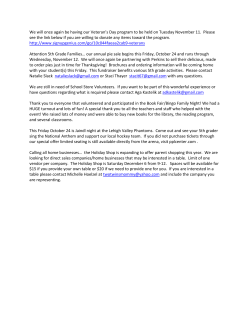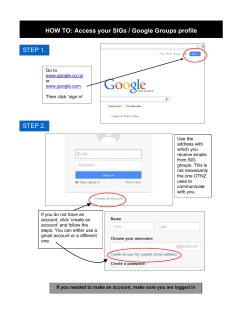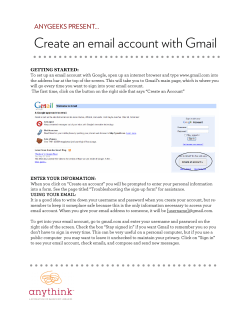
Shabbos Handout Parshat Toledot 29 Cheshvan 5775 November
Congregation Sons of Israel Upcoming Events 2715 W Tilghman St Allentown PA 18104 www.sonsofisrael.net april2715@gmail.com Phone: 610-433-6089 Fax: 610-433-6080 A Women’s Melava Malka will be held Saturday night, Nov. 22nd at 7:30 p.m. at the home of Kira Bub, 1550 Hampton Rd. Guest speaker, Tzippora Harris, will speak on “If You Only Knew Who You Really Are! Accessing Clarity About the Important Things in Life”. Please RSVP to rachelmwilensky@gmail.com. קהילת בני ישראל Congregation Sons of Israel Parshat Toledot 29 Cheshvan, 5775 November 22, 2014 rd Rabbi David Wilensky rdwilensky@gmail.com President Dr. Scott Brenner gogiantsdaddy@gmail.com VP of Education Robert Simon smrobbies@aol.com VP of Finance Harry Fisher hfisher613@gmail.com VP of Membership Lorrie Scherline lorscherline@gmail.com Men’s Club Chair Marcel Guindine guindine@verizon.net Sisterhood Co-chairs Sarah Danna sarahbethdanna@gmail.com Alyssa Komarow arkomarow@gmail.com Ritual Committee Chair Robert Simon smrobbies@aol.com House Committee Chairs Joe Aflalo calishco@aol.com Marcel Guindine guindine@verizon.net Chesed Committee Chair Alyssa Komarow arkomarow@gmail.com Turkey and Torah Craft & Games: On Sunday, Nov. 23 , at 2:00 p.m., children ages 4 and up are invited to a pre-Thanksgiving themed craft event...the only one with a Turkey and Torah Trivia contest! Prizes and snacks will give us even more to be thankful about. RSVP to Joanna Powers at joannapowers8@gmail.com. Join us for “The Interstices of Jewish History”, Winter Lecture Series I, led by Rabbi Wilensky on Tuesday nights in December at 7:00 p.m. — On Dec. 2nd: “Of Cossacks, Sabbateanism and Pogroms: Understanding the Emden/Eybeschutz Debacle. On Dec. 9th: “The Jews of the 18th Century Eastern Europe: The Fallout Between the Vilna Goan and the Chassidic Movement On Dec. 16th: “Hatikvah, the Magen David and Herzl: An Analysis of Zionist Roots & Rifts” Chanukah Toy Drive: Donate new (unwrapped) toys and gifts and bring them to the shul office during November. These gifts will be distributed to needy Jewish children right before Chanukah. You are invited to hear guest lecturer, Rabbi Moty Berger, speak on “Five Steps to Understanding Yourself Through Torah” on Wednesday night, Dec. 3rd at 7:30 p.m. at the home of Karen and Peter Cooper, 726 Weygadt Drive in Easton. The Jewish Day School is honoring Rabbis and Cantors of our Lehigh Valley congregations at their 61st Annual Gala Dinner Dance on Sat. evening, Dec. 6th, at 7:30 p.m. at the JCC. Please consider joining us so that we can honor the clergy and our community. To reserve a seat or place a tribute ad, please contact the JDS. Announcements Kiddush following services. Chanukah Toy Drive: Donate new (unwrapped) toys and gifts and bring them to the shul office during November. These gifts will be distributed to needy Jewish children right before Chanukah. Please note that the shul office will be closed on Friday, November 28th, and that Rabbi Wilensky will be away Thanksgiving weekend. A speedy recovery to Scott Brenner and to Joan Lichtenstein. Shabbos Schedule 8:00 AM 9:00 AM 10:20 AM 12 noon 3:05 PM 4:05 PM 5:22 PM Minyanim November 23-29 Sunday Regular Classes Daily Daf Yomi Sunday—Friday 7:30 AM Wednesdays “Husbands Anonymous” with R’ Wilensky — next date TBD 8:00 PM Shabbos Beginner’s Gemara with Dr. Henry Grossbard 8:00 AM Con-Siddur-ations” (Beginner’s Minyan), with R’ Wilensky — 1st Shabbat of the month - 10:00 AM “Contemporary Halachik Issues”, with R’ Wilensky 12 noon Daf Yomi 1 hr. before Mincha Beginner’s Gemara Class Shacharis Jr. Congregation Contemporary Halachik Issues: He has come by deception: Is lying ever permitted?” Daf Yomi Mincha, Shalosh Se’udos Shabbos concludes 11/23 (Rosh Chodesh) Monday Tuesday Wed Thursday Friday Shabbos 11/24 11/25 11/26 11/27 11/28 11/29 AM 8:30 AM 6:30 AM 6:45 AM 6:45 AM 6:30 AM 6:45 AM 9:00 AM PM 4:15 PM 4:15 PM 4:15 PM 4:15 PM 4:15 PM 4:15 PM 4:05 PM Parsha Toledot“Friday Night Grandpa” With Rabbi Dr. Tzvi Hersh Weinreb Veteran readers of this column are familiar with my paternal grandfather, Chaim Yitzchak Weinreb. He was an old-school Jew, with roots in the region of eastern Poland known as Galicia. He had studied under renowned Talmudists back in the old country, and his fervent wish was to see his grandchildren grow up to be dedicated Talmud students. song, and demonstrate how the Talmud elucidates the Bible, in an “amazing” way. Only he didn’t say “amazing,” he said “vunderbar.” That Friday, true to his word, and he was always true to his word, he personally served me the kugel and soda, taught me a song that he had learned from the old rabbi of his now-extinct shtetl, and asked me to review with him a short passage in this week’s Torah portion, Parshat Toldot (Genesis 25:19 -28:9). You know the story. Esau, the older brother, comes in from the field, famished. He finds his younger brother, Jacob, cooking a pot of I was his oldest grandchild and discovered stew and asks for some of it. Jacob is willing from a very early age just how determined to give it to him, but for a price. He demands he was to steer me in what he was that Esau first sell him his birthright; that is, convinced was the right direction. I the material and spiritual privileges that particularly remember the time he visited my come with being the first-born. Translated parents’ home when I was in the seventh or literally, he says: “Sell me your birthright, eighth grade. I had just received my report kayom, like today!” card and proudly showed it to him. I felt it Whereas nowadays, kids will call their elderly was a pretty good report card, but for him, grandfather Zaidie or Saba, we called ours anything less than perfection was inadequate. After one glance, he noticed just Grandpa. Despite his old-fashioned how uneven my academic performance was. demeanor, in many ways he was as American as apple pie. He asked me if I He spoke to me in Yiddish, unadulterated by found anything problematic with the story. English phrases — pure, old-fashioned I did. “The phrase ‘kayom’ seems strange, Yiddish. He protested that my grades were spotty. “You did very well in Chumash, Bible, Grandpa. Why does Jacob insist that the sale should be ‘like today?’” but not nearly as good in Talmud. How can one truly know the Bible if he is ignorant of He responded, “Good! Maybe you have a Talmud?” Gemara kopp [a Talmudic intellect] after all! I responded defensively by saying that I saw But let’s see if you can ask a question on the no connection between the Bible portions of whole transaction based on the Talmud texts Bereshit that we were then studying and the you are now studying in school. Here’s your tractate of Bava Metzia, our Talmud text that volume of Talmud. I’ll give you ten minutes to come up with a really good question.” year. “The Chumash is full of great stories, but the Talmud is only about legal arguTo say that I was frustrated would be putting ments, some of which are over my head.” it mildly. Not only was I going to be stuck studying all Friday night—I was actually He smiled and said that if I would give him being asked to think! an hour on the upcoming Friday night, he would give me kugel and soda, teach me a But one did not say no to Grandpa. So I opened the large book, pored over it and focused on the task with great concentration. I was searching for a connection between a fascinating story and what I then experienced as some very boring rules and regulations. After some time, probably much more than the allotted ten minutes, I had an “aha” experience. I really got excited. “Grandpa! It can’t be! How could Jacob purchase the birthright from Esau? The privileges of the birthright are way off in the future. They include privileges like a dual portion of their inheritance of their father Isaac’s estate, and Isaac was alive, if not entirely well, at that time. We studied in the Talmud that one cannot buy or sell objects or privileges which do not yet exist!” My grandfather was thrilled, but no more than I was. Finally, I saw a connection between my Bible stories and the legal terminology of the Talmud that I had begun to resent. He then sat back, asked me to relax, and took the role of the teacher. “If you reached page 16 of the tractate you are studying, you know this scenario. A fisherman wishes to sell the fish he will catch that today to a customer. He doesn’t have the fish yet. Can he sell them? Yes, answers the Talmud. He can sell them if he desperately needs the money to feed himself that day. But if he wishes to sell the fish he will catch in thirty days or in a year, he cannot do that. If one is desperate, he can sell even objects that he does not yet possess, even fish that are still in the sea.” There is a logical rationale for this legal principle, which I will omit from this column in the interest of brevity. Suffice it to say that I now saw the connection between the story and the Talmudic principle: “Of course Jacob said kayom. Sell me your birthright even though its privileges will not be realized until the distant future, but do so in your current state of desperation. Do so because you are famished, and in your desperation have the legal ability, much like the fisherman, to sell something which is now non-existent, because you need it for your urgent immediate needs. Sell me the birthright kayom.” Grandpa was proud of me that day, but I was even prouder of myself. He told me that the concept that I had discovered on my own was to be found in the commentary Ohr HaChaim, which he studied assiduously every Friday night. He then leaned back, stared at me with his gentle blue eyes and said, “I am trying to think of a prize, a reward for your willingness to sit with me for a few hours on a Friday night, for exerting your young intellect, and for seeing the connection between the Written Torah, Scripture, and Oral Torah, Talmud.” I sat there imagining all sorts of possible rewards, certain that he would ask for my input. Kugel and soda would have been acceptable, but lowest on my list of suggestions. I was thinking big bucks, or at least tickets to a baseball game. Then he told me his idea. “From now on, every time I visit you, we will study together. And we will make it our business to discover connections. Our motto will be the verse in Psalms that says that G-d’s Torah is perfect, soothes the soul and brings joy to the heart.” What a disappointment for a twelve-yearold. But today, many decades later, each time I sit down before a folio of Talmud, I experience Grandpa’s reward. I can now appreciate Grandpa’s willingness to risk his popularity with his grandchildren, instead using every means at his disposal to get us to sit and learn with him.
© Copyright 2025














